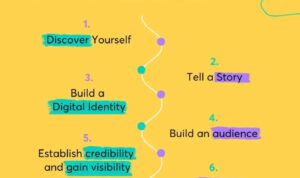Kicking off with Personal Branding Tips, this opening paragraph is designed to captivate and engage the readers, setting the tone american high school hip style that unfolds with each word.
In today’s competitive world, establishing a strong personal brand is key to success. From defining your unique value proposition to leveraging social media, these tips will help you navigate the world of personal branding with style and confidence.
Importance of Personal Branding

In today’s competitive market, personal branding plays a crucial role in shaping an individual’s professional reputation and career trajectory. It is a strategic way to differentiate yourself from others and showcase your unique skills, strengths, and values.
Setting Yourself Apart
A strong personal brand can help individuals stand out in a crowded job market and attract potential employers or clients. By effectively communicating your expertise and showcasing your personal brand, you can build credibility and trust with your audience.
- Developing a consistent online presence through social media platforms like LinkedIn can help professionals establish themselves as industry experts.
- Crafting a compelling personal brand statement that highlights your unique value proposition can leave a lasting impression on employers and clients.
- Showcasing your work through a professional portfolio or website can provide tangible evidence of your skills and expertise.
Successful personal branding strategies involve authentic self-promotion, consistent messaging, and a clear understanding of your target audience.
Building Your Personal Brand
Creating a personal brand involves defining your unique value proposition, identifying your target audience, and maintaining a consistent brand image across different platforms.
Defining Your Unique Value Proposition
In order to build a strong personal brand, it’s essential to define your unique value proposition. This involves identifying what sets you apart from others in your field. Consider your strengths, skills, and experiences that make you stand out. Your unique value proposition should clearly communicate what you have to offer and why others should choose you.
- Reflect on your strengths and skills to determine what makes you unique.
- Identify your key accomplishments and experiences that showcase your expertise.
- Create a compelling personal brand statement that highlights your unique value proposition.
Identifying Your Target Audience
Understanding your target audience is crucial for effective personal branding. By knowing who you are trying to reach, you can tailor your messaging and content to resonate with them. Research your target audience to gain insights into their needs, preferences, and behaviors. This will help you create content that speaks directly to them.
- Conduct market research to identify your target audience demographics and psychographics.
- Create buyer personas to represent different segments of your target audience.
- Engage with your audience through social media and other platforms to gather feedback and insights.
Creating a Consistent Brand Image, Personal Branding Tips
Maintaining a consistent brand image across different platforms is key to building credibility and recognition. Your brand image includes visual elements such as your logo, colors, and design style, as well as your tone of voice and messaging. Consistency helps establish trust with your audience and reinforces your brand identity.
- Develop brand guidelines to ensure consistency in visual and written content.
- Use the same profile picture and bio across all social media platforms.
- Create a content calendar to plan and schedule posts that align with your brand image.
Online Presence and Personal Branding

In today’s digital age, having a strong online presence is crucial for building and maintaining your personal brand. Your online presence serves as a virtual resume, showcasing your skills, expertise, and personality to a global audience. It allows you to establish yourself as a thought leader in your industry and connect with like-minded individuals.
The Importance of Maintaining a Strong Online Presence
Having a strong online presence can help you:
- Build credibility and trust with your audience.
- Reach a wider audience and expand your network.
- Showcase your expertise and unique personality.
- Stay relevant and up-to-date in your field.
Strategies for Leveraging Social Media to Enhance Personal Branding
Social media can be a powerful tool for enhancing your personal brand. Here are some strategies to consider:
- Choose the right platforms that align with your target audience.
- Consistently share valuable content that showcases your expertise.
- Engage with your followers by responding to comments and messages.
- Collaborate with influencers or industry leaders to expand your reach.
Tips on Creating Engaging Content that Aligns with Your Personal Brand
Creating engaging content is key to building a strong personal brand. Here are some tips to help you create content that resonates with your audience:
- Understand your audience and tailor your content to their interests and needs.
- Be authentic and true to your personal brand voice.
- Utilize visual elements such as photos, videos, and infographics to make your content more engaging.
- Consistently share valuable and relevant content to keep your audience engaged.
Networking and Personal Branding: Personal Branding Tips
Networking plays a crucial role in building a strong personal brand. It allows you to connect with like-minded individuals, industry professionals, and potential clients or customers. Effective networking can help you expand your reach, gain valuable insights, and create opportunities for collaboration and growth.
Tips for Effective Networking
- Attend industry events, conferences, and seminars to meet new people and expand your network.
- Utilize social media platforms like LinkedIn to connect with professionals in your field and engage in meaningful conversations.
- Join networking groups or organizations relevant to your industry to build relationships with key players.
- Follow up with contacts regularly to maintain strong connections and stay top of mind.
- Offer to help others in your network without expecting anything in return, as building genuine relationships is key.
Successful Networking Strategies for Personal Branding
One successful networking strategy is to focus on building relationships rather than just collecting contacts. By nurturing authentic connections, you can create a strong support system that will champion your personal brand.
Another effective strategy is to leverage your existing network for introductions and referrals. By tapping into the connections of your contacts, you can expand your reach and credibility within your industry.
Additionally, participating in mentorship programs or seeking out mentorship opportunities can provide valuable guidance and insights to help you enhance your personal brand through networking.
Personal Branding Pitfalls to Avoid
When it comes to personal branding, there are certain pitfalls that individuals should be mindful of in order to maintain a strong and consistent brand identity. Making common mistakes can have a negative impact on your personal branding efforts, so it’s important to navigate challenges and setbacks effectively.
Avoiding Inconsistency
One of the biggest pitfalls in personal branding is inconsistency. This can manifest in various ways, such as using different tones or messaging across different platforms, or failing to update your online presence regularly. Inconsistency can confuse your audience and weaken the overall impact of your personal brand.
Over-Promotion
Another common mistake is over-promoting yourself without providing value to your audience. Constantly talking about your achievements or skills without engaging with your audience or offering meaningful content can come off as self-centered and turn people away from your brand.
Ignoring Feedback
Feedback, whether positive or negative, is crucial for personal branding. Ignoring feedback or failing to address criticisms can hinder your growth and improvement. It’s important to listen to what others have to say about your brand and make necessary adjustments to enhance your reputation.
Copying Others
Trying to imitate someone else’s personal brand is a mistake that can backfire. Authenticity is key in personal branding, and copying others will only make you seem inauthentic and unoriginal. Focus on showcasing your unique strengths and personality instead of trying to be someone you’re not.


